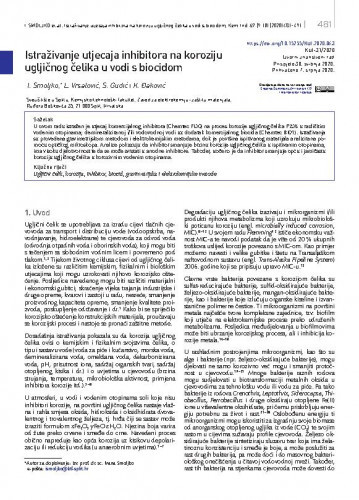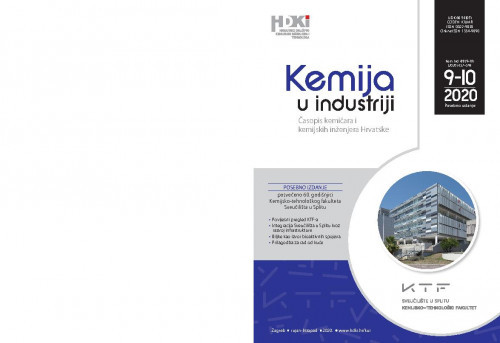U ovom radu istražen je utjecaj komercijalnog inhibitora (Chemtec FI30) na proces korozije ugljičnog čelika P235 u različitim vodenim otopinama; demineraliziranoj i/ili vodovodnoj vodi uz dodatak komercijalnog biocida (Chemtec BI01). Istraživanja su provedena gravimetrijskom metodom i elektrokemijskim metodama, dok je površina ispitivanog materijala analizirana pomoću optičkog mikroskopa. Analize pokazuju da inhibitor smanjuje brzinu korozije ugljičnog čelika u ispitivanim otopinama, ima visoku djelotvornost te da se može svrstati u anodne inhibitore. Također, uočeno je da inhibitor smanjuje opću i jamičastu koroziju ugljičnog čelika u korozivnim vodenim otopinama.; The effect of a commercial inhibitor (Chemtec FI30) on the corrosion of P235 carbon steel in water (demineralised and/or tap water) with the addition of a commercial biocide (Chemtec BI01) was studied in the present work. This study was carried out by weight loss and electrochemical methods, while specimen’s surface was examined using optical microscope. Results obtained from gravimetric measurement revealed that P235 carbon steel corroded in aqueous solution, i.e., in a solution of demineralised and tap water (50 : 50) and a biocide (Fig. 1), and in tap water with a biocide (Fig. 5). By analysing the surface of carbon steel with an optical microscope, general and pitting corrosion was observed, which was more pronounced in tap water with biocide (Figs. 2 and 6). The addition of a commercial inhibitor significantly reduced the occurrence of corrosion damage on the surface of carbon steel (Figs. 3, 4, 7, and 8) and decreased the rate of carbon steel corrosion in all aqueous solutions (Table 1). Electrochemical investigations performed by open circuit potential measurement, linear polarisation and potentiodynamic polarisation measurement showed that the inhibitor Chemtec FI03 shifted the potential to more positive values (Figs. 9 and 10), increased polarisation resistance (Table 3), decreased the rate of carbon steel corrosion, and had high efficiency in all tested solutions (Table 4). The results obtained showed that this commercial inhibitor could be used as an effective inhibitor for the corrosion of carbon steel in aqueous media.
Sažetak

 Kemija u industriji : 69,9/10 (2020) / glavni i odgovorni urednik Nenad Bolf.
Kemija u industriji : 69,9/10 (2020) / glavni i odgovorni urednik Nenad Bolf.